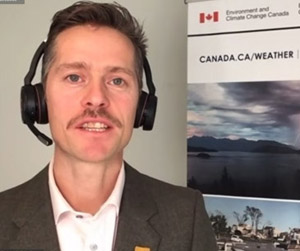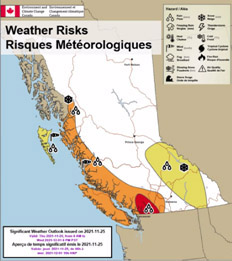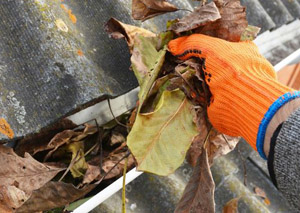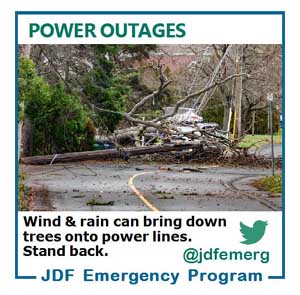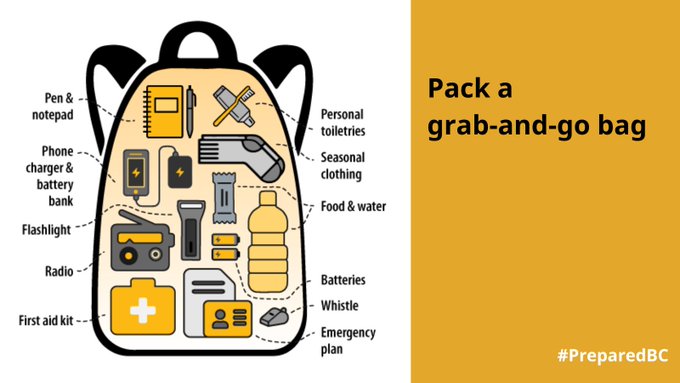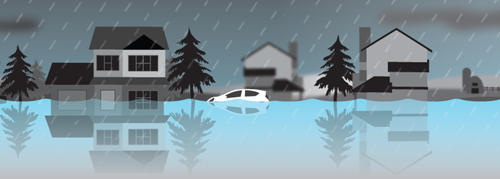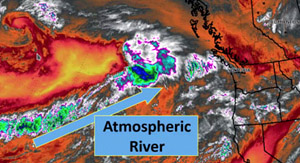
Thursday November 25, 2021 | LANGFORD, BC [Updated November 26, 2021 at 1 pm & 3:45 pm]
by Mary P Brooke, Editor | Island Social Trends
Fall season storms bring heavy rain, strong winds and snow to many parts of BC. There are three such storms expected over the next week, say weather forecasters.
The Environment Canada weather forecast for Greater Victoria includes rain events again this coming weekend (Nov 27-28), and on Tuesday/Wednesday next week (Nov 30 into Dec 1), as reported by Armel Castellan of Environment Canada, on November 26 in a technical media update.
Castellan notes there is “very little time in between” the two storms, in terms of an already saturated ground being able to absorb additional precipitation. Therefore, flooding is always a possibility.
“There is still dangerous weather ahead,” he said in a technical briefing today. “Any extra moisture runs more easily or quicker,” Castellan told media. The briefing is also posted on Facebook.
“Changes in the landscape (from the recent flood event of November 13-15) and “new extraordinary amount of moisture is going to change the landscape” further. A higher snow-melt from the mountains will add to water flow.
There have been six atmospheric rivers so far this fall 2021 season (including the one on November 25), with the next two being the seventh and eighth, said Castellan.
From this trio of atmospheric rivers, Castellan is not expecting a “worst case scenario” as was seen at its peak on November 15.
Environment Canada has a green-orange-red alert system for indicating the intensity of storms and weather events. The red level has not ever been used in BC, Castellan said today; he has worked for Environment Canada for over 20 years.
Prep your home:
Protect your home by cleaning gutters and unclogging outside drains of debris from accumulated. Also pay attention to any culverts that might be blocking water flow.
The recommendation by emergency preparedness folks is to clear snow away from a home’s foundation by one to 1.5 metres (3-5’ ft).
Other ways to protect your property from flooding are posted on the Preparedbc.ca/floods website.
Stay off roadways when requested:
During heavy rainfall, if local officials or DriveBC recommend staying off the roads (other than for essential travel), then that’s a good idea to follow, says Jeri Grant who coordinates the Juan de Fuca Emergency Program.
Have your headlights on when traveling in heavy rain conditions, she adds.
If instructed to travel only when essential, follow though instructions so that roadways are clear for first responders.
Power outages:
“There is every possibility we will have power outages as well, prepare your home for that and make sure you have all your electronic devices fully charged including power banks,” says Jeri Grant.
An alternative cooking source like a camp stove is a great idea in the case of power outages. Those inexpensive battery-operated ‘puck lights’ work like a charm and avoid the dangers that come with using candles.
Remember to replenish the fuel supply in your generator, but remember the current fuel rationing for November 19 to December 1, 2021 that has been put in place by the province (maximum 30 litres per fill at retail station stations).
Stay clear of downed power lines; they can still be energized. Standing back the distance of a bus is the easiest way to remain how far back to be.
“Check on your neighbours, especially the elderly,” says Grant.
Emergency kits:
It’s good to have emergency kits ready at any time. That sort of grab-and-go bag should include food and water, seasonal clothing, batteries, whistle, first aid kit, radio, flashlight, phone charger and battery bank, pen and notepad, personal toiletries and an emergency plan.
One such kit or bag for each member of your family, including your pets, is a good idea.
Place them where you’ll find them easily in the case of an emergency. That includes home, vehicle and workplace.




